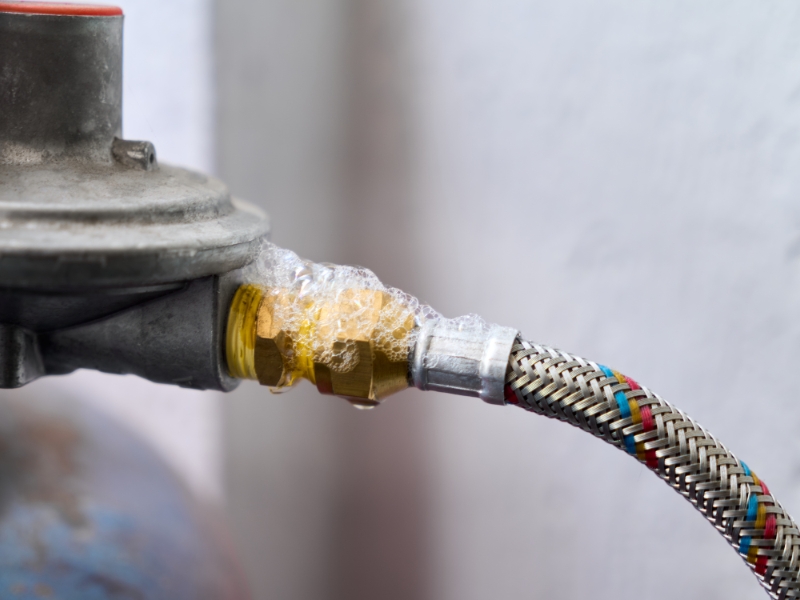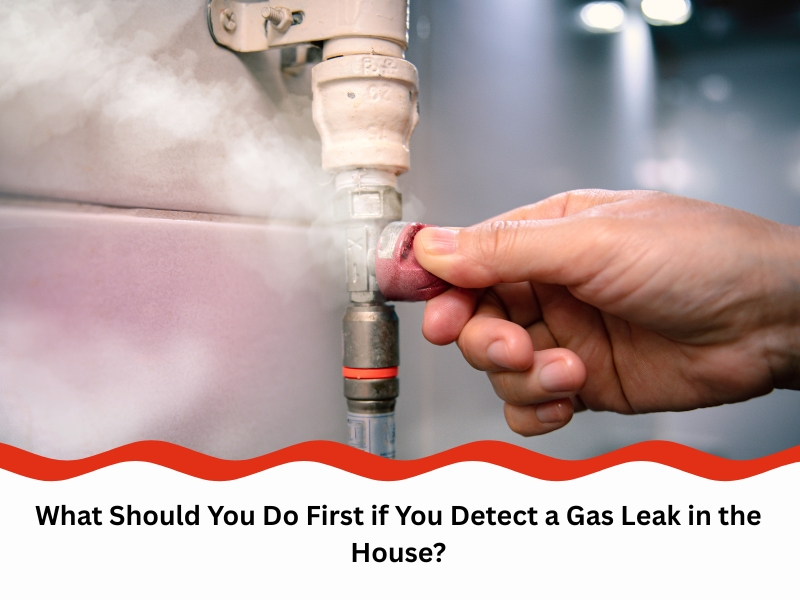Smelling gas or suspecting a leak inside your home can be an incredibly stressful experience. But don’t panic—knowing what steps to take immediately can protect you and your family from potential harm. Whether it’s a faint odour near your gas stove or a strong smell throughout the home, acting quickly and safely is crucial if you detect a gas leak in the house. This article will walk you through the warning signs, safety tips, and next steps if you suspect a gas leak in your home.
Why are gas leaks so dangerous?
Gas leaks are silent hazards—often invisible but incredibly risky. Natural gas is highly flammable and capable of displacing oxygen, making any delay in response potentially fatal. That’s why it’s vital to understand just how serious the consequences of an undetected gas leak can be. Common risks linked to household gas leaks:
- Fire hazards: Gas is highly flammable. A single spark could trigger a fire or explosion.
- Health issues: Prolonged exposure can cause headaches, nausea, dizziness, and even loss of consciousness.
- Carbon monoxide poisoning: While gas leaks are not always the cause, malfunctioning gas appliances can release deadly carbon monoxide.
- Environmental damage: Gas leaks waste energy and contribute to greenhouse gas emissions.
- Structural damage: If a leak leads to an explosion, your property could suffer severe damage.
The risks of a gas leak go beyond inconvenience. They can endanger your health, your home, and even your life. That’s why early detection and swift action are critical.
What are the first signs of a gas leak at home?
Early detection can save lives. Most gas leaks start with subtle signs before becoming noticeable. Common reasons why gas appliances stop working suddenly can also be linked to these early warning signs, making it crucial to stay vigilant. Tell-tale indicators of a gas leak include:
- Rotten egg smell: Most natural gas has a chemical called mercaptan added to give it a sulphur-like smell.
- Hissing sounds: Gas escaping from a pipe or appliance may create a whistling or hissing noise.
- Dead or discoloured plants: Unexpected dying vegetation inside or near your house can indicate an underground gas leak.
- Bubbles in water: If you notice bubbles in puddles or your garden soil, gas might be escaping underground.
- Headaches or dizziness: Exposure to leaking gas can make you feel faint, nauseous, or unwell.

If you detect a gas leak in a house situation, stay alert to these signs. A strange smell or sudden health symptoms are your first warnings.
When does a gas leak become an emergency in the house?
While all gas leaks are serious, some become outright emergencies. This is often because there are reasons gas leaks frequently go unnoticed, making it crucial to stay vigilant. If you suspect a leak is beyond your control, don’t wait—treat it as a high-risk situation immediately.A gas leak becomes an emergency when:
- You smell a strong, consistent gas odour indoors
- You hear a loud hissing sound from a gas pipe or appliance
- You or someone else feels dizzy, confused, or nauseated
- You see visible signs of damage to a gas line
- Gas continues to leak despite turning off the appliances
If these signs are present, evacuate immediately and call emergency services. Do not attempt DIY fixes or re-enter your home.
What appliances are common sources of gas leaks?
Understanding which appliances are prone to leaks can help you monitor and maintain them properly.
Appliance | Risk Level | Maintenance Tip |
Gas stove | High | Check seals and connectors monthly |
Gas heater | Very High | Annual professional servicing |
Hot water system | Moderate | Inspect for leaks quarterly |
Gas dryer | Moderate | Clean vents regularly |
Outdoor BBQ | High | Replace hoses every 1–2 years |
Regular inspection and professional servicing of these appliances are essential—not only to prevent leaks and keep your home safe, but also to identify signs of a gas leak that need immediate attention.
Can you detect a gas leak in the house without tools?
Absolutely. While gas detectors are helpful, you don’t need fancy gadgets to spot a leak. Your senses and a few DIY tricks can go a long way. DIY gas leak detection methods:
- Smell: The easiest method—natural gas smells like rotten eggs.
- Listen: Tune in for hissing sounds, especially around joints and pipes.
- Bubble test: Mix dish soap and water, and apply it to suspected areas. Bubbles = gas escape.
- Watch pets: Animals may act anxious or avoid certain areas.
- Monitor plants: Dead spots in your garden may suggest a buried gas line issue.

You don’t always need high-tech tools to detect a gas leak in a house setup. A little awareness and observation can make all the difference.
Is it safe to stay inside after a gas leak?
If you suspect a gas leak—even a minor one—leave the area immediately. Gas is unpredictable, and a single spark can cause an explosion. There are also serious health risks of inhaling LPG fumes in confined spaces, including dizziness, nausea, and even asphyxiation. Simply put, staying inside isn’t worth the risk.
- Gas accumulates quickly, especially in enclosed areas.
- Appliances and light switches can spark fires.
- Carbon monoxide can build up undetected, causing poisoning.
- Evacuation allows professionals to assess the risk thoroughly.
- Better safe than sorry—leaving eliminates exposure to health hazards.
Once you detect a gas leak in your house, don’t hesitate—leave the premises immediately and contact professionals.
Can you use appliances after you detect a gas leak in your house?
Absolutely not. Using appliances—even briefly—can trigger a fire or explosion if gas is present in the air, especially considering how faulty gas devices increase the risk of carbon monoxide exposure. Avoid using the following if you detect a gas leak:
Avoid doing the following once a leak is suspected:
- Turning on or off light switches.
- Using mobile phones inside the house.
- Operating gas stoves or ovens.
- Starting fans, air conditioners, or heaters.
- Lighting candles or smoking.
Instead, you should:
- Open all windows and doors to ventilate.
- Evacuate the building calmly and quickly.
- Turn off the gas at the main valve if it is safe.
- Call a licensed gas plumber from outside.
Once you detect a gas leak in your house, avoid all electrical and gas-powered devices until the area has been declared safe.
How can you prevent future gas leaks?
Staying proactive is your best bet—regular servicing and awareness can help you avoid dangerous situations altogether. Find a reliable gas leak detection solution for your property to ensure peace of mind and added safety.
Prevention Method | Frequency | Professional Help Needed? |
Appliance servicing | Annually | Yes |
Hose inspections | Every 6 months | Not always |
Leak detection tests | Year-round | Yes |
Detector installation | One-time | Yes |
Staying proactive is your best bet. Regular servicing and awareness can help you avoid dangerous situations altogether.
Stay alert and stay safe.
A gas leak isn’t just a minor household inconvenience—it’s a serious risk. If you detect a gas leak in your house, staying calm and acting immediately can save lives. Know the signs, maintain your appliances, and never ignore your gut feeling. And when in doubt, don’t hesitate to call the pros.
If you suspect a gas leak, get in touch with the team at Apex Gas Heater Service for immediate assistance.

